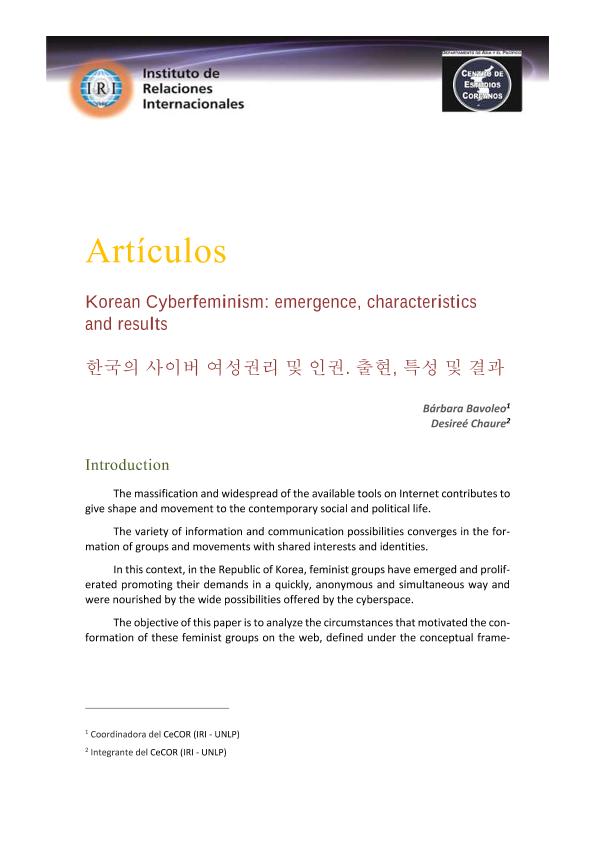Artículo
Korean Cyberfeminism: emergence, characteristics and results
Título:
한국의 사이버 여성권리 및 인권. 출현, 특성 및 결과
Fecha de publicación:
08/2020
Editorial:
Universidad Nacional de La Plata. Facultad de Ciencias Jurídicas y Sociales. Instituto de Relaciones Internacionales
Revista:
Anuario en Relaciones Internacionales
e-ISSN:
1668-639X
Idioma:
Inglés
Tipo de recurso:
Artículo publicado
Clasificación temática:
Resumen
The massification and widespread of the available tools on Internet contributes togive shape and movement to the contemporary social and political life.The variety of information and communication possibilities converges in the formation of groups and movements with shared interests and identities. In this context, in the Republic of Korea, feminist groups have emerged and proliferated promoting their demands in a quickly, anonymous and simultaneous way and were nourished by the wide possibilities offered by the cyberspace.The objective of this paper is to analyze the circumstances that motivated the conformation of these feminist groups on the web, defined under the conceptual framework of cyberfeminism, its characteristics and the consequences of its actions at a cultural and political level. This information allows us to outline the possibilities of its future development.The analysis dimensions include: the member?s characteristics, the collaboration?s types, the topics of interest, the action?s modalities, and the positioning with respect to the LGBT community.We consider that cyberfeminism has gained considerably social importance in South Korea and has influenced public opinion, also affecting the establishment of public policy agenda.The methodological approach, of qualitative nature, is nourished by previous ownresearch, specialized literature, and information collected/gathered from IT tools thatprovide/allow the analysis of our object of study. This paper considers contextual variables, such as the internet expansion and the feminism history in the country, in order to analyze the structuration of the feminist movement online.The general results achieved about cyberfeminism in Korea are focus on the member's characteristic, the types of collaboration between its members, the topics of interest, the modality of action and their positioning with respect to the demands of the LGBT community in the feminist struggle. Based on the outcomes of the investigation, it concludes with recommendationson how the South Korean feminism can influence society and promote public demonstrations that can result in changes in public policies. It also reflects on the intervention of online groups and the gender dynamics on the internet, which are strongly shaped by globalization.
Palabras clave:
CYBERFEMINISM
,
SOUTH KOREA
,
ICT
,
FEMINISM
Archivos asociados
Licencia
Identificadores
Colecciones
Articulos(CCT - LA PLATA)
Articulos de CTRO.CIENTIFICO TECNOL.CONICET - LA PLATA
Articulos de CTRO.CIENTIFICO TECNOL.CONICET - LA PLATA
Citación
Bavoleo, Bárbara Inés; Chaure, Desirée; Korean Cyberfeminism: emergence, characteristics and results; Universidad Nacional de La Plata. Facultad de Ciencias Jurídicas y Sociales. Instituto de Relaciones Internacionales; Anuario en Relaciones Internacionales; 2020; 8-2020; 1-17
Compartir




